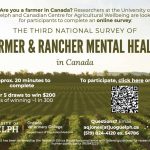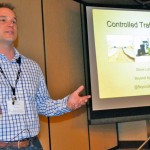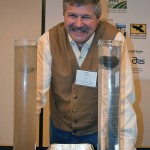
Tag Archives Tillage

Is the freeze-thaw effect a myth?

Healthy soil the key to healthy profits
Look beyond ‘bench-top chemistry’ in evaluating soil health, urges soil microbiologist
Seed producer says vertical tillage is just the ticket
Greg Smith says vertical tillage has worked so well on his perennial grasses and alfalfa, he’s now using it for his grains and oilseed crops to manage residue
Looking to breathe new life into perennial seed crop stands? Consider vertical tillage. Beginning with his meadow fescue fields, forage seed producer Greg Smith began using vertical tillage two years ago to loosen up sod-bound fields and has been pleased with the results — higher yields in second- and even third-year plant stands. “Meadow fescueManitobans helping North Korean farmers
Manitobans with expertise in zero till and soil health are helping farmers increase productivity in the isolated nation
When it comes to North Korea, agriculture may not be the first thing that pops into people’s minds. But for the Mennonite Central Committee (MCC) it’s been front and centre for the last five years. The Winnipeg-based organization has been providing farmers in the Democratic People’s Republic of Korea with assistance with soil conservation and
Conservation agriculture will play a key role in feeding future populations
Conference told that by employing permaculture, cover crops, strategic rotation and reduced tillage, small landowners can generate surpluses and contribute to food security
Sarah Jaibes isn’t a soil scientist, or an international development expert, but she knows a lot about how to make small farms work and what it will take to feed nine billion people by 2050. The Zimbabwean farmer became involved in conservation agriculture in 2009, after rising inflation made it difficult to live on herProtect that investment
Kazakhstan farmers reap benefits of conservation tillage
Farmers using zero till reported yields of two tons per hectare while some farmers using conventional practices lost their entire crop
Kazakhstan’s 2012 drought and high temperatures cut the country’s wheat harvests by more than half from 2011 output, but wheat under zero-tillage practices gave up to three times more grain than conventionally cultivated crops. Two million hectares are currently under zero tillage, making Kazakhstan one of the top 10 countries for conservation agriculture and helpingFighting more deserts
Researchers praise the many benefits of cover crops
University of Manitoba plant science researcher says farmers need to think more about what happens below a field’s surface and how they can improve soil health
It’s time for farmers to stop treating soil like dirt. “The role of a farmer is to manage a complex ecosystem to produce food, feed, fibre and fuel,” University of Manitoba plant science researcher Yvonne Lawley said at the recent Ecological and Organic Farming conference. “Millions of ‘moving parts’ need to work together, both aboveJury still out on benefits of deep ripping
There has been a host of studies on whether deep ripping can fix soil compaction but the results have been inconclusive
Does deep ripping fix soil compaction and improve yields? Despite numerous studies, no one really knows, attendees at the recent Special Crops Symposium in Brandon were told. “Collectively, we haven’t done enough disciplined testing or research yet to sort out whether or not it is profitable in Manitoba,” said John Heard, soil fertility specialist with

